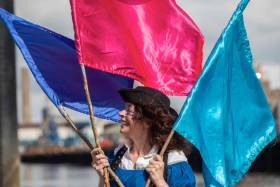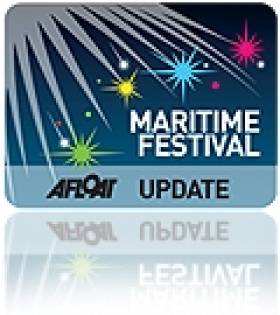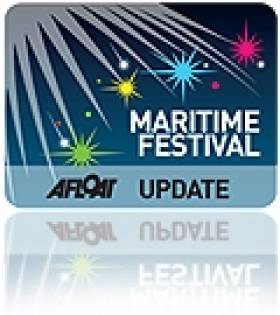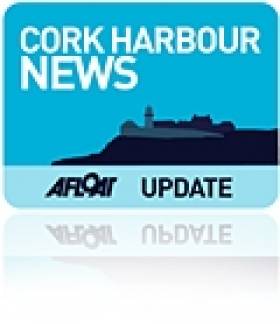Displaying items by tag: An Rás Mór
Cork Harbour Festival is sure to make a big splash this June Bank Holiday Weekend.
And the festivities are only beginning on Saturday 1 June, with nine days celebrating all things maritime taking over Leeside and Cork Harbour — for those with their sea legs and landlubbers (or land lovers) alike.
The showcase event that draws huge crowds every year is Ocean to City – An Rás Mór.
The race is the largest of its kind in Ireland and attracts competitors from all over Europe and as far as the USA.
The 200-strong fleet will give spectators a chance to see an array of vessels from traditional wooden boats, currachs and gigs to Chinese dragon boats, kayaks and even stand-up paddleboards.
The race starts in Crosshaven at 10.30am on Saturday and there will be free family entertainment, music and food at some of the best viewing points along the race route at Cobh, Passage West, Blackrock Pier and the city centre.
If you’re feeling energetic, you can cycle alongside the fleet for part of the racecourse from Father O’Flynn Park in Passage West.
Or you can get caught in the rhythm at the Port of Cork with a 14ft drum for all to play – no experience of drumming necessary.
Take your place at the finish line at Lapp’s Quay with live race commentary from Cork’s 96FM and food stalls, street performances, balloon artists, DJs, drummers and much more to keep you entertained while you welcome the participants as they complete this spectacular race.
If you prefer to stay on dry land, you’ve so much to choose from – with Camden Fort, Elizabeth Fort and Spike Island all open for tours every day of the Bank Holiday weekend.
As the sun sets there will be some very special performances happening including the Johnny Cash Tribute on Spike Island on Saturday evening, and a swashbuckling concert performance of The Pirates of Penzance on Sunday at Cork Opera House.
Most of the festival events are family friendly, making this the ideal way to have some great waterside adventures with the kids (and the young at heart!)
There’s everything from children’s storytelling in Passage West Library to Cobh Harbour tours.
Bring your trainee pirates to the Circus Factory on Saturday for some pirate circus training, or get the whole family team working together for orienteering on Sunday and Monday with Bishopstown Orienteering Club.
Join the ‘3 For the Sea’ Beach Day in Myrtleville on Sunday, or being bidding artists to the Crawford Art Gallery on Monday for a family-friendly art workshop and tour.
But no Cork Harbour Festival would be complete without a chance to get out on the water.
SailCork in East Ferry have an open day on Bank Holiday Monday, and you can try sailing at the world-famous Royal Cork Yacht Club with free tasters on Sunday.
With a weekend packed full of water-based activities, you can brave a high-speed harbour tour, paddle, kayak, sail, surf or SUP your way through the weekend.
Get all the details of the full festival programme with over 70 events on CorkHarbourFestival.com.
#OceantoCity – Today's Ocean to City Race 'An Rás Mór' involving 122 entries can be viewed live on the big screen along Cork's Lapp's Quay thanks to Cork City Council.
The live-stream is also available from www.corkcity.ie/tv starting from 12 noon onwards so tell your family and friends!
The 28km rowing race which first began in 2005 is the highlight of the 10-day Ocean to City Maritime Festival that celebrates Cork's unique maritime heritage and attracts entries from all over the world.
The course begins at Crosshaven and crosses Cork Harbour via Cobh, Monkstown, Passage and Blackrock before reaching the finish line at Lapp's Quay.
An expected 500 Irish and international rowers will compete in a diverse range of vessels including currachs, Irish coastal rowing boats, Bantry longboats, kayaks, Cornish pilot gigs and Chinese dragon boats.
Among the participating currachs is the brand new Dalkey built Naomh Beagnait which as previously reported on Afloat.ie was a community led project which saw the 22ft craft make her maiden voyage only last weekend.
Ocean to City Fest Celebrates Cork's Maritime Heritage
#CorkHarbour - Rowboat and kayak trips, harbour cruises, street markets and much more will be in store for Cork Harbour's maritime festival Ocean to City from tomorrow 1 June.
The highlight of the 10-day festival as it's been since 2005 will be An Rás Mór on Saturday 8 June, a 28km rowing race that celebrates Cork's unique maritime heritage and attracts entries from all over the world.
The course begins at Crosshaven and crosses Cork Harbour via Cobh, Monkstown, Passage and Blackrock before reaching the finish line at Lapp's Quay in Cork’s city centre.
An expected 500 Irish and international rowers will compete in a diverse range of vessels including currachs, Irish coastal rowing boats, Bantry longboats, kayaks, Cornish pilot gigs and Chinese dragon boats.
On-street entertainment, food markets and live music will also reverberate from the Lapp's Quay finish line throughout the day before the finale event and prize giving which will take place in the Clarion Hotel.
Other events during the week include the Dragon Boat Challenge tomorrow afternoon from 2pm-8pm at Lapp's Quay and kayak expeditions along the River Lee on Tuesday 4 June and Friday 7 June - not to mention the Cork City Marathon on Bank Holiday Monday 3 June.
For more see the festival programme HERE.
Ocean to City, Cork Harbour's annual maritime festival, takes place this year from 3-12 June.
The yearly celebration of Cork’s maritime history and its unique harbour begins on Friday 3 June when members of the public can voyage through the city by kayak, enjoy the thrill of a sea safari trip around Cork Harbour or follow TG4’s Padraig Ó Duinnín as he presents a historical walking tour and talk on rowing in Cork.
The highlight of the festival, An Rás Mór, takes place on Saturday 4 June and will see boats of all sizes row 15 nautical miles from Crosshaven via Cork Harbour, Monkstown and Blackrock before finishing at the boardwalk in Lapps Quay in Cork.
Around 400 Irish and International rowers will compete in a diverse range of vessels including dragon boats, kayaks, currachs, Celtic long boats, Cornish pilot gigs and Irish coastal rowing boats.
Sunday 5 June will see a special 10km kayak race through the city centre. The Irish Naval Service flagship LE Orla will also offer free public tours, while Meitheal Mara will host a guided voyage around the island of Cork by a variety of small craft.
To mark the Cork Harbour School and Heritage Trails Weekend from from 9-11 June, a series of events highlighting the attractions of Cork Harbour, both water and land based, will take place.
Activities include a summer school on the theme of 'recreation in a working port', which will be held in the Port of Cork on Friday 10 June and opened by Minister for the Marine Simon Coveney.
For more details visit www.oceantocity.com.
































































